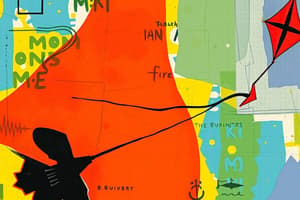Podcast
Questions and Answers
What is meant by the term 'King of all bicycles'?
What is meant by the term 'King of all bicycles'?
- An old, rusty bike
- A bicycle for everyone in Kabul
- A common bicycle
- An elite and powerful status symbol (correct)
What does Amir's father believe about Amir's happiness?
What does Amir's father believe about Amir's happiness?
Baba believes that Amir will be happy with material possessions like other kids.
How has Amir's perspective changed over time?
How has Amir's perspective changed over time?
Amir has matured and is becoming less like other children due to his experiences.
What does 'blood money' refer to in the context of Hassan's sacrifice?
What does 'blood money' refer to in the context of Hassan's sacrifice?
What does Ali's reaction to Amir's gifts indicate?
What does Ali's reaction to Amir's gifts indicate?
How does Ali show his loyalty despite Amir's mistreatment?
How does Ali show his loyalty despite Amir's mistreatment?
What does the old book symbolize in Amir's life?
What does the old book symbolize in Amir's life?
What story reflects the theme of betrayal in Amir and Hassan's lives?
What story reflects the theme of betrayal in Amir and Hassan's lives?
What does Amir want to express to Ali, and why is he conflicted?
What does Amir want to express to Ali, and why is he conflicted?
What does the structure in Amir's description of planting money represent?
What does the structure in Amir's description of planting money represent?
What does Ali's statement about not working for Baba anymore signify?
What does Ali's statement about not working for Baba anymore signify?
How is Baba's emotional state depicted when he cries?
How is Baba's emotional state depicted when he cries?
Study Notes
Materialism and Relationships
- "King of all bicycles" symbolizes elite status and material reward, highlighting Amir's desire for Baba’s attention rather than emotional connection.
- Baba's belief that Amir will find happiness through conventional means emphasizes his insensitivity towards Amir's needs for love and affection.
Amir's Character Development
- Amir's recognition of personal growth indicates maturity as he grapples with his past actions, different from typical childhood perspectives.
- The term "blood money" signifies Hassan’s sacrifice for Amir's success, revealing the hollow nature of Amir’s rewards.
Significance of Objects
- Ali’s acknowledgment of the emotional value of the well-loved book reveals Amir's materialistic perspective, contrasting worth with sentimental significance.
- The old book symbolizes the depth of friendship and childhood innocence, enhancing the theme of lost purity.
Reflective Narratives
- The story of Rostam and Sohrab illustrates themes of betrayal and conflict, paralleling Amir and Hassan's intricate relationship.
- Amir’s internal conflict is characterized by a desire to express gratitude, clashing with tendencies to avoid vulnerability.
Moral Ambiguity and Conflict
- Amir's description of planting money and watch reflects moral turmoil; deliberate omissions indicate a disconnect from his emotions and considerations about his actions.
- This calculated behavior suggests an adult avoidance of the emotional burden tied to past experiences.
Dynamics of Power and Loyalty
- Ali’s assertive refusal of Baba’s commands demonstrates a shift in power dynamics, maintaining loyalty while insisting on independence.
- Baba's emotional breakdown and plea for Ali to remain underscores the tension between his authoritative persona and vulnerability stemming from grief.
Emotional Themes
- Baba’s tears reveal a profound internal struggle, showcasing the complexity of his character as he confronts loss and guilt tied to Amir’s actions towards Hassan.
Studying That Suits You
Use AI to generate personalized quizzes and flashcards to suit your learning preferences.
Description
Explore key vocabulary and concepts from Chapter 9 of The Kite Runner. This set of flashcards highlights important themes and character dynamics, particularly the relationship between Amir and Baba. Test your understanding of the text and its deeper meanings.




